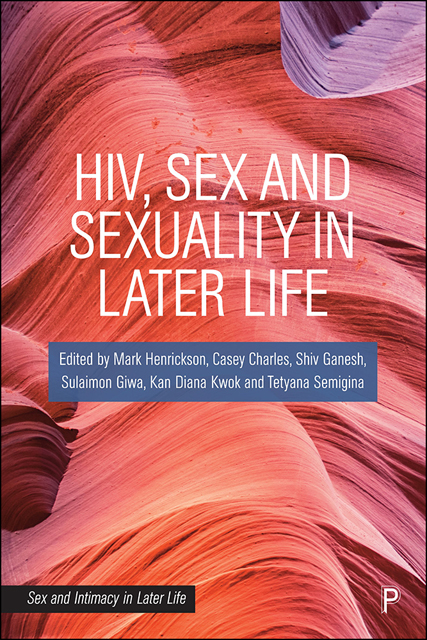1 - The ‘disease of love’: trajectories of women ageing with HIV in Switzerland
Published online by Cambridge University Press: 16 June 2023
Summary
Introduction
More than 40 years have passed since the first cases of AIDS were reported in 1981. The apocalyptic scenario of the 1980s was replaced by an optimistic medical discourse following the advent of antiretroviral therapy (ART). ART transformed HIV into a manageable public health issue (Rosenbrock et al, 2000; World Health Organization, 2016) and increased the life expectancy of people living with HIV in high-income countries (Hasse et al, 2011). The ageing of people living with HIV, referred to as the ‘ “graying” of the epidemic’ (Blanco et al, 2010, p 218), is gaining recognition (High et al, 2012; Banens et al, 2015). It raises several questions among HIV/AIDS experts and people living with HIV, especially as regards medical issues such as comorbidities and care services dependency (Kearney et al, 2010; Levett et al, 2014). While the life expectancy of people living with HIV is increasing, new HIV-positive diagnoses among people aged 50 and over are also rising (Banens et al, 2015; Bernard et al, 2018). Beyond medical and health-related concerns, few studies report on the social experiences of ageing with HIV in high-income countries. In the rare cases that do, women are under-represented or continue to be classified as ‘others’ (Mensah, 2003; Banens et al, 2015). In effect, in the official history of the AIDS epidemic, women living with HIV have been forgotten in clinical, epidemiological and social science research (Corea, 1993; Wilton, 1997; Mensah, 2003; Webel et al, 2013), except for women considered at risk of transmitting the virus, such as sex workers (Treichler, 1987), migrants (Poglia Mileti et al, 2014), mothers (Latham et al, 2001) and caregivers (McIntosh and Rosselli, 2012). However, not all women living with HIV fit into these categories.
In Switzerland, which is characterised by a liberal model of public health, approximately 20,000 people are living with HIV. Women make up a quarter of this population. While men are mainly infected through sexual relations with other men, women are mostly (70 per cent) infected through heterosexual intercourse (FOPH, 2018b). The key HIV populations defined by the Federal Office of Public Health (FOPH) are: homosexual men and men having sex with men, drug users, sex workers and people from countries with a high HIV prevalence (FOPH, 2018a).
- Type
- Chapter
- Information
- HIV, Sex and Sexuality in Later Life , pp. 11 - 27Publisher: Bristol University PressPrint publication year: 2022



